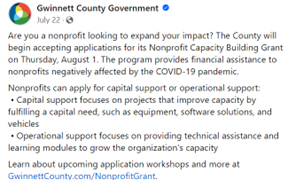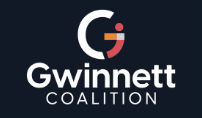The 2021 American Rescue Plan Act allocated $350 billion to the State and Local Fiscal Recovery Funds (SLFRF) program for state, local, Tribal, and territorial governments. All of these governments can use some or all of these funds to partner with charitable nonprofits to advance recovery from the COVID-19 pandemic. Fewer than 100 days remain for governments to obligate – have a written agreement – their remaining SLFRF dollars; any unobligated funds must be returned to the U.S. Treasury. As the deadline approaches, many governments are actively reaching out to nonprofits. We asked for positive examples and our colleagues at the Gwinnett Coalition, which is northeast of Atlanta, pointed to their local government as a paragon of virtuous grantmaking with a purpose.
Gwinnett County’s Partnership with Nonprofits
Gwinnett County, Georgia, received $181.9 million in SLFRF resources in 2021 and the County’s Grants Management Division has been providing “grants management services to departments and elected offices.” They have been conscientious in asking how do we determine which nonprofits to fund and what is the support they need? One answer was to utilize the county’s ongoing planning as a resource for guiding SLFRF spending.
The Nonprofit Capacity Building Grant
In 2023, the County released its Human Services Five-Year Strategic Plan that laid out the goals, objectives, and measures to “optimize the delivery and accessibility of human services” and “build a more resilient, responsive, and interconnected support system that uplifts our entire community,” according to Nicole Love Hendrickson, the Chairwoman of the Gwinnett County Board of Commissioners. With the Human Services Strategic Plan as a guiding document, the County Board of Commissioners approved $5 million in funding to go towards Nonprofit Capacity Building this year.
The Board of Commissioners set as a worthy goal of the Nonprofit Capacity Building Grant to “increase the effectiveness and strength of local nonprofits to enhance their impact on our community,” and makes the distinction between operational and capital support. Given how many times smaller nonprofits are excluded from or unable to apply for grants because of eligibility restrictions or other requirements, the County also prioritized funding for nonprofits and organizations with an annual operating budget of up to $250,000.
The press release announcing the Nonprofit Capacity Building Grant captures the nature of the partnership between Gwinnett’s nonprofits and the County Board of Commissioners: “I’ve witnessed firsthand the incredible impact of Gwinnett's nonprofits — they tackle critical needs and make a real difference in people's lives,” said Chairwoman Love Hendrickson. “Our nonprofit partners help the County to bridge crucial gaps, and we hope this round of grant funding empowers recipients to expand their impact and fulfill their essential missions.”

Once the application was ready to go live, the County spread the word through various channels, including social media, to make sure as many local nonprofits knew well in advance about the goal of the grant, the support for which they are eligible, where to apply, and the deadline. Further, the County did not just post once and move on: it shared the application in at least two more posts before the August 30 deadline. Often email alerts with links to applications get lost in an inbox, and social media moves very quickly, so this approach ensured that the grant application had ongoing traction and take-up rates leading up to the August 30 deadline.
Gwinnet County is on track to obligate all its SLFRF resources by the end of the year. The impact of these thoughtful grants will last well beyond the SLFRF program and improve the community for years to come. Gwinnett Coalition President and CEO Renee Byrd-Lewis summarized the respect and appreciation of nonprofits, saying “A long-time partner with Gwinnett County Government, we’re thankful for a county that sees the nonprofit sector as a critical partner in advancing the well-being of our community.”
About the Gwinnett Coalition
Gwinnett Coalition

The Gwinnett Coalition is a nonprofit with a vision for an equitable, resilient, and healthy Gwinnett. Connecting people and resources, they are leading systems change and building capacity to advance community well-being. Through their three pillars—health equity, mental and behavioral health, and nonprofit capacity building— they tackle root causes and big-picture problems that impact all members of the community.
